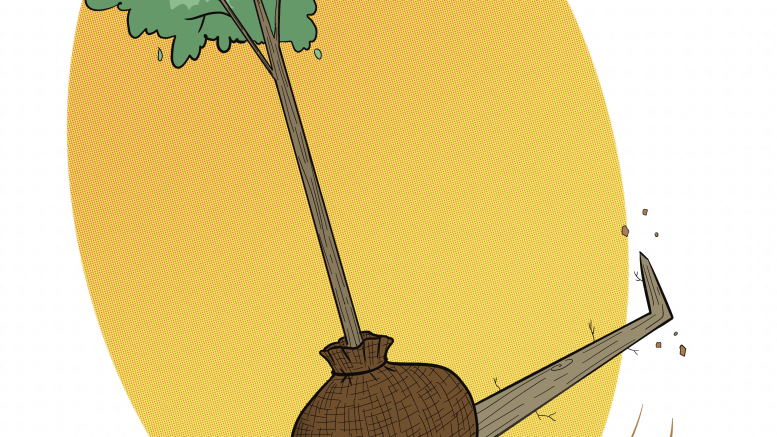For most students, summer jobs are a source of income. I’ve been fortunate enough to discover one that is more than just a lucrative paycheque — it doubles as a source of fulfilment.
Just before the pandemic hit in 2019, I overheard two students talking about their intention to go work as tree planters that summer. Later that day, my curiosity about the job remained. Within a few hours, I researched and applied to work for Brinkman Reforestation Ltd. as a tree planter. The next morning, I was hired — beginning my journey into Canada’s hidden industry.
Four years and hundreds of thousands of trees planted later, I can safely say that applying was one of the best decisions I’ve ever made. There are few things, never mind jobs, that I speak of with as much reverence as I do with tree planting.
There are numerous reforestation companies nationwide. I’ve worked for multiple myself across four different provinces, each with its own merit. I visited the stunning mountaintop views in Alberta, refined my French in a monolingual workplace in rural Quebec and acquainted myself with the amicable people in Ontario.
Every workday one can expect to do a single task: plant trees. As a planter, you are fed by camp cooks, taken to and from work and told what, where and how to plant. A planter’s only job is to plant.
Each tree weighs only a few grams. Planters wear a set of bags with one on each side, which hold the trees waiting to be planted. Depending on the species, bags can carry between two and six hundred trees. The catch is the more in your bags, the heavier they are, which slows your movement.
The amount people plant varies, and so does their pay. The job is piecework. Depending on several variables such as land difficulty and species, the amount one is compensated per tree planted ranges from 14 cents to upwards of 28 cents.
It was explained to me once that in planting you “earn what you’re worth.”
Planting one tree is easy, any able-bodied person can do it. But when you get paid 14 to 28 cents per tree, there is no money in planting one tree. Think of planting as picking up around 17 pennies that are six feet apart all day. The formula is simple: the more you plant, the more you make. Want to make a little over $500? Plant 3,000 trees.
The freedom planters are given is a double-edged sword. You are free to take breaks throughout the day and plant low amounts. However, you are also free to make as much as you’d like if you’re willing to earn it. As good as it feels to break all day instead of planting, it feels better to make $700.
Given the demanding physicality of the job, you work three or four days on and one day off. You lose track of weekdays. There is no Monday to Friday. Your schedule is day one, two, three and day four — also known as party night — and then a day off. Planters cherish party nights. After a few days of gruelling work, the only thing we want is to let loose until the sun rises.
The entire job is outside. This, I admit, is the most unappealing aspect of the job. If it rains, you work. If it’s hot, you work. And here’s the kicker: you live in a tent. The good news is that the job is temporary — a planting season itself is usually around two months from May to early July.
There is the option of planting the remaining summer months and fall. Last year, I planted for nearly four months earning enough for my tuition and semester abroad in Belgium. I’ve heard countless stories of people planting each summer and finishing their degrees debt-free.
Given the scale of land needed for a camp to plant more than 100,000 trees every day, a planter’s workplace is often located near an obscure rural town. Places you’d otherwise never visit become home for a few weeks until your camp packs up and moves to another area or province.
In most camps, there are roughly 60 people, most of whom are students.
More than anything, the people are the reason for my return. A camp is a society separated from the outside world, each with its own culture and population. The lively population turns tree planting into an experience rather than a job. In two months, those who begin as strangers turn into adored friends.
Tree planting is not easy, it is a physical and mental challenge with great rewards. It’s extremely fulfilling to be able to look at the forest you planted at the end of each day. There is a great sense of pride in the resilience of being a planter.
It’s equally as fulfilling to share that experience with your campmates. The highs and lows foster a group bond that cannot be replicated or understood by anyone who wasn’t there. Through tree planting, I’ve met people who’ve come to be a defining part of my life.
Unbeknownst to me when applying, I stumbled upon what I can only describe as a student’s paradise. There is no place I’d rather spend my summer.
The experience is well worth doing for all those willing. It’s a boisterous adventure of new friends, money, partying and a summer you’ll never forget.



